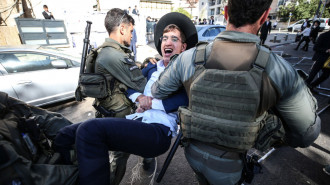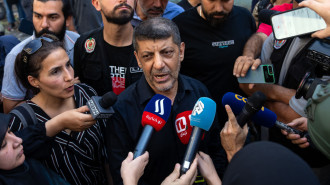Sudan's Wad al-Noura families speak of RFP's carnage, intentional targeting children
From the dawn of June 5 onwards, it's all been a blur for Samia Othman. The 32-year-old teacher narrowly survived the Rapid Sudan Forces' (RSF) carnage in her hometown of Wad al-Noura in central Sudan, which left at least 200 people killed, and has been roaming aimlessly for a safe place to stay.
"They raided every house, indiscriminately killing, torturing, raping. They respected no honour, storming people's bedrooms and shooting people in their beds. Even children weren't spared," said a distraught Othman, who lost four family members, three of whom were children.
At least 55 children were either killed or injured in the RSF attacks on the town of Wad Al-Noura. According to residents, some of the town's members have taken up arms against the RSF, which is seen as the reason behind the paramilitary's repeated targeting of the town and its people.
The 5 June massacre, in which at least 130 people were civilians, renewed global concerns about the massive civilian toll of the year-long war that broke out in April 2023 between the paramilitary forces and the Sudanese Armed Forces (SAF) over power.
Othman, speaking by phone from her new location in Al-Managil locality, described a state of panic and horror that gripped Wad al-Noura's residents in the central Al-Jazira state, many of whom are internally-displaced people who have fled fighting elsewhere in the country.
With dozens of armed vehicles raiding the town in the early hours of the day, and a swarm of armed men with heavy artillery wreaking havoc till late afternoon, Othman was among the thousands of civilians to flee, aimlessly, in search of shelter away from their raided homes. It was hours of walking on foot, with other fleeing families, before she reached the safety of Al-Managil.
"People just ran for their lives, and because the communication network is terrible, families couldn't connect with one another," said Othman, who learned of her siblings and nephew's death days after the assault. "It's unfair. This is all unfair," she said.
Apart from slight resistance by a grassroots group that was set up to protect residents, the paramilitary went ahead with their rampage, the latest in countless atrocities that has claimed thousands of lives, and led to the world's worst internal displacement crisis. With more than three million children displaced inside and outside the country, Sudan is the most significant child displacement crisis, according to the UN's humanitarian agency, OCHA.
"What the RSF does to us is akin to what the Israelis are doing to our brethren in Gaza," exclaimed Othman in tears.
Targeting children
According to Khaled Mohamed Al-Dow, a 48-year-old merchant, rows of shot children, most of whom were between 12 and 16 children, were among those he helped bury in mass graves following the June 5 raid by RSF.
"I saw the heavy artillery firing away at everyone as I took shelter, and I saw children’s frail bodies riddled with bullets as I helped lay them down in the graves," said an emotional man. He, too, was among those who fled the Wad Al-Noura to another part of Al-Jazira province.
"This is a small town and a close-knit community. It's not only the families of those children killed who are grieving, but we all are," said Al-Dow. "Nothing justifies this whatsoever."
Samira Abdulsattar, another survivor of the massacre, said children in Wad el-Noura and other towns in Al-Jazira have been targeted by RSF fighters since December, when the paramilitary captured the province's capital city of Wad Madani.
"They've been kidnapping children from their homes in demand of ransom, and families that fail to pay the ransom get the slain bodies of their kids," said the 42-year-old mother who refused to speak of her children, fearing for their safety.
Confirming reports of children being kidnapped by the RSF but unable to provide numbers of how many children were subjected to this, social activist Azza al-Nour said "RSF fighters in Wad al-Noura and other towns, lock up the kidnapped children in barns and coops for days, with little to no food, until they get paid by the families, or else leave those kids to die."
Officials from Sudan's National Council for Child Welfare also confirmed these reports to The New Arab, but said no official tally of the victims was kept, due to poor communication networks that deter solid and reliable connection to families of victims.
Abdulsattar recounted how on 6 June, the RSF exchanged fire with a number of armed men who had set up a group to protect residents of the town from looting or assaults. "But it's not in the battlefields that most killing took place. It was in homes and houses that children, elders, women, and men were killed…"
She added that "families spent their days outside their homes, in hideouts, returning home only in the evenings, to avoid having their kids kidnapped or women abused, since RSF fighters slept through the night. However, more and more just fled their homes and the whole town, in search of refuge elsewhere, after the June 6 attacks." She's among those who were displaced, she said, and had arrived with her family to escape to the town of Al-Fao in Gedarif, eastern Sudan.
While confirming the atrocities committed by RSF against children, Rehab Al-Mubarak, a member of Sudan’s Emergency Lawyers, asserted SAF's air raids on Wad al-Noura following the attack also killed five children. "Sudan's children, like all civilians, are not spared by neither of the parties," she concluded.
This piece was published in collaboration with Egab.







 Follow the Middle East's top stories in English at The New Arab on Google News
Follow the Middle East's top stories in English at The New Arab on Google News


